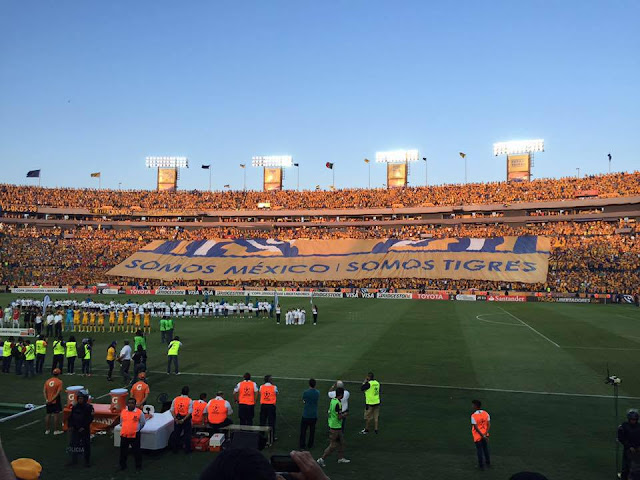Key to
River Plate's successful continental stride so far under Marcelo Gallardo have been
the full-backs Leonel Vangioni and Gabriel Mercado. When Gallardo deployed a
diamond in midfield with traditional playmaker Pisculichi and the squad became
thus too narrow, both defenders thoroughly maintained their positions and formed
a defensive line of four centre-backs that gave much solidity behind. That's
why River gets ultra-competitive in finals and that's why they got a draw in
Monterrey against Tigres that leaves all to be decided in Buenos Aires next
week.
Gallardo, a
traditional number ten himself as a player, got rid of his trademark diamond in
favor of a more pragmatic 4-4-2 with no playmaker ahead of this Libertadores's
first leg against Boca Juniors. The wingers, Uruguayans Carlos Sánchez and
Tabaré Viudez, work their flanks so Mercado and Vangioni are scarcely exposed to
the rival's full-backs and Matías Kranevitter brilliantly guards the front of his
defense while Leo Ponzio harries whoever gets the ball. In front,
Teo Gutiérrez used to drop and work the channels to provide the width lost by
the cautiousness of Mercado and Vangioni. Recently signed forward Lucas Alario
is completely different: the strategy with Rodrigo Mora against Tigres
yesterday focused in making life difficult to Guido Pizarro, Tigres' holding midfielder.
As a result
of harassing Pizarro and pushing him deep between the Tigres centre-backs, the Liga
Mx side's game-building became a bit nervous and prone to making mistakes under
pressure. Soon before Hugo Ayala was subbed off due to injury in the first
half, he and Juninho got entangled with the ball, Nahuel Guzmán forced to sweep
behind them, and Ayala knocked over by his own goalkeeper. In some ways
Gallardo was astute enough to identify the key players in Tigres' tactical
backbone (Pizarro, Rafael Sobis and André-Pierre Gignac) and isolate them with
double covers. Maidana and Funes-Mori, River's central defenders, more often
than not alienated and annoyed the Frenchman with harsh maneuvers; and
Kranevitter negated Sobis any pocket of space between the lines with his
positional awareness throwing him into Ponzio's custody. It's not strange then
that Tigres boss Ricardo Ferretti instructed Sobis to exchange positions with
Damián Álvarez in the left wing to form a 4-3-3 during the last minutes of the
match when the locals got the best of a now shaky River Plate backline.
Despite the fact that Gallardo tells Vangioni and Mercado to keep position and be cohesive, River Plate get distressed when their opposition launches wingers and full-backs to attack high up the pitch. When faced with Edgardo Bauza's San Lorenzo at Recopa Sudamericana, full-backs Emmanuel Mas and Julio Buffarini showed that River bleeds at the outside. The best chances of Tigres came when right winger Jürgen Damm took on Vangioni: the first half promising cross that Sobis should have headered home, and the second half poor Vangioni tackle that left Damm alone in front of River's goalkeeper Marcelo Barovero. The flanks, the flanks, the flanks, appears to be the mantra for Ricardo Ferretti at Monumental de Núñez.
Gallardo
may resort to promising young defender Emanuel Mammana to cover the absence of
Mercado due to a second yellow card, but otherwise his side will be as expected
from the Monterrey leg. Individually, Tigres seem a superior squad
and pretty much well trained, but the Argentines should appeal at their crowds
and Gallardo surely may retreat back (even more) to set his squad on 'finals
mode'.



